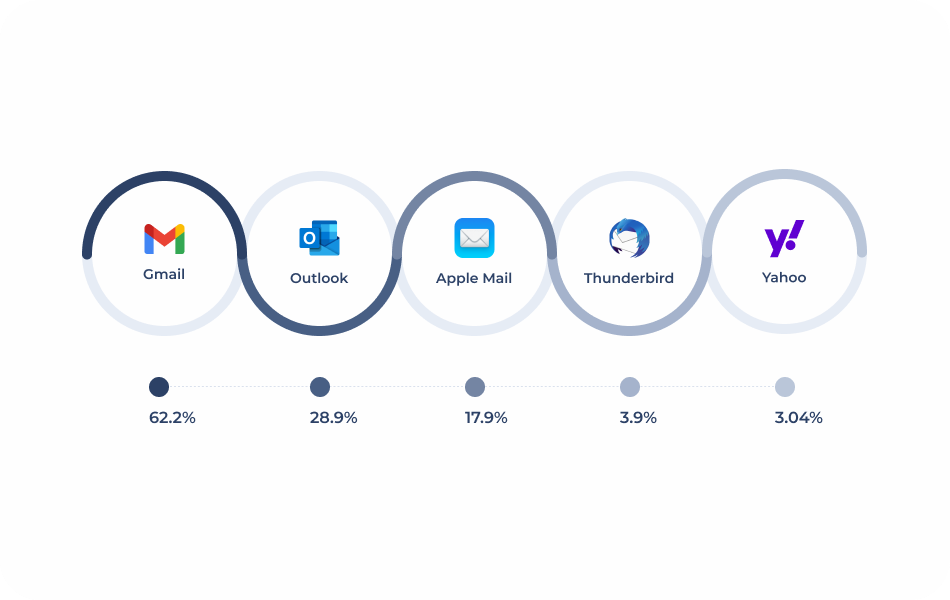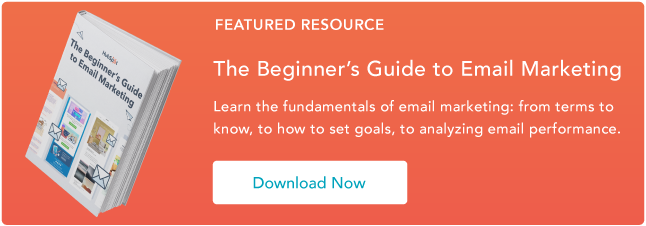[ad_1]
Email signatures serve as a powerful way for individuals and businesses to leave a lasting impression on their recipients.

In this article, we will share valuable insights derived from the feedback of numerous participants and email signatures of thousands of users of the MySignature service in 2023.
Keep reading to uncover the latest trends that will help you enhance your professional branding and boost engagement with recipients.
Top Email Signature Insights
Let’s look at the most basic statistics first and then get into the details.
- On average, users send a moderate volume of business emails, ranging from 11 to 25 per day.
- A significant percentage, 77.8%, of users check their email inbox more than five times a day. On the other hand, 18.1% of users check their inbox 2-4 times a day.
- The vast majority, 89.9%, have a single email signature, while 8.6% use up to 10 different signatures.
- 44.4% of users update their email signatures 2-4 times per year, demonstrating a commitment to keeping their communication fresh and relevant. In addition, 31.6% update their signatures every few years.
- Maintaining corporate consistency (25.1%) and improving branding and awareness (28.7%) are key objectives for using email signatures. These goals underscore the importance of consistent and effective email communications within an organization.
- A significant portion, 36.3%, of users do not utilize email trackers. Of those who do, 25.1% opt for paid trackers, while 14.1% prefer free alternatives.
Now, let’s take a closer look at the detailed statistics regarding the use of email signatures.
How many business emails do people send each day?
28.8% send a moderate volume of 11-25 emails per day. However, 11.7% of users have a high email volume, sending more than 50 emails per day.
For these high-volume emailers, email signatures become a valuable tool for email marketing and brand promotion. After all, why not take advantage of the blank space at the end of every email?
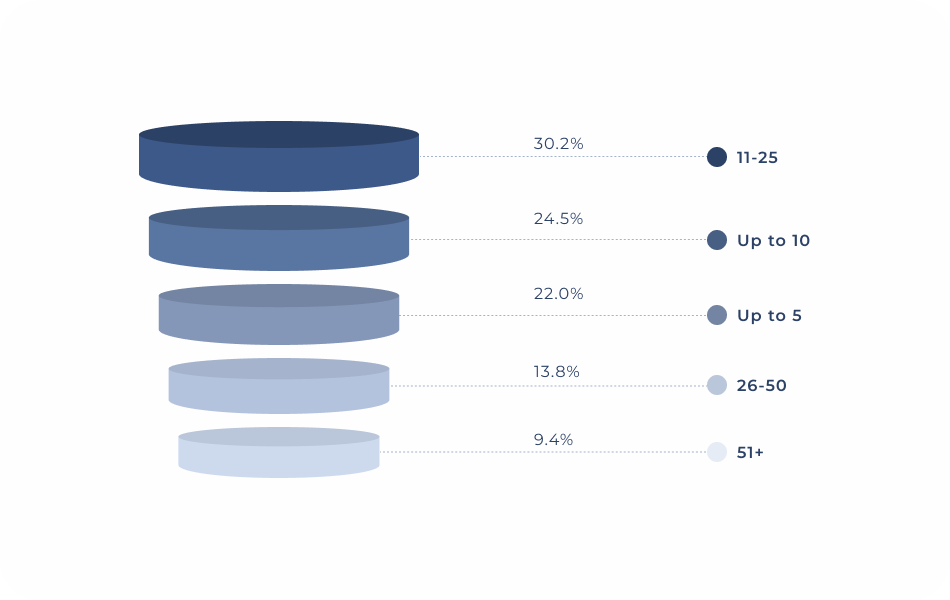
What are the most popular email clients among users in 2023?
Interesting discovery: Gmail is the most widely used email client among users, with a clear majority of 62.2%. Outlook follows in popularity with 28.9%, while Apple Mail comes in third with 17.9%. Thunderbird and Yahoo are less popular, with 3.9% and 3.04% of users, respectively.
How often do people check email?
Knowing how often people check their email can help you manage your time and be more productive. You can also get faster responses and better engagement by choosing the right times to send important emails.
According to the results, the majority of users, a significant 77.8%, check their email more than five times a day. Conversely, only a small percentage, 4.1%, look into their inbox only once a day. These results show that most people use email frequently and regularly.
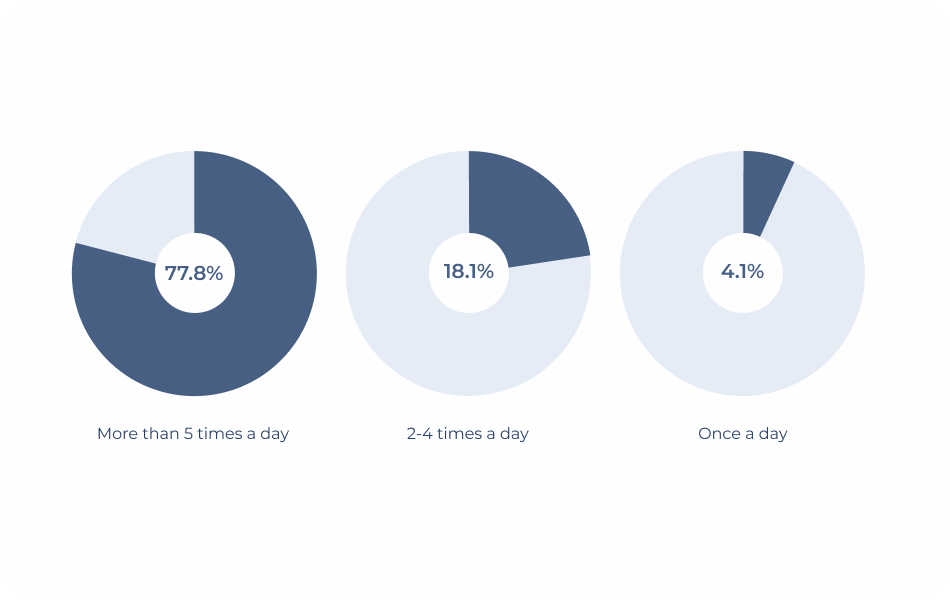
What are the most popular social networks to include in email signatures?
As you can guess, it’s quite common to add social media links in email signatures. This way, users’ expand their options to connect with their recipients beyond email.
Among the various platforms, Instagram is the most commonly added social media link, appearing in 69.3% of email signatures. Facebook follows closely at 62.1%. Other popular social media links include LinkedIn (42.2%), YouTube (23.8%), Twitter (17.5%), TikTok (11.4%), Pinterest (4.5%), and Reddit (1.85%).
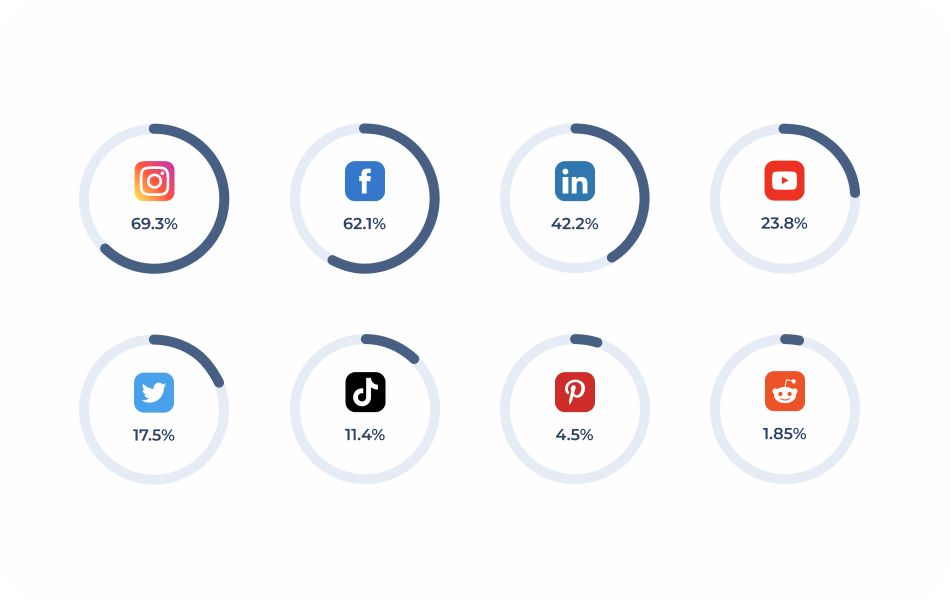
What are the primary goals of using email signatures?
Branding and awareness were the top primary goals for utilizing email signatures.
This was closely followed by the goal of ensuring consistent signatures across the organization, highlighting the importance of maintaining a cohesive image.
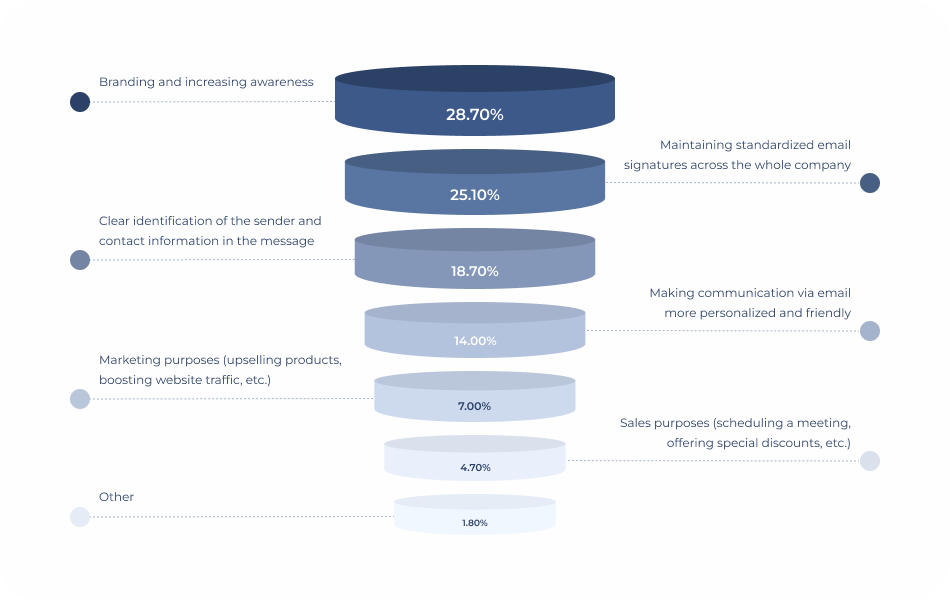
The survey also found that email signatures are often used for marketing purposes.
Generating leads (18.8%), promoting social media (15.86%), and building a newsletter email list (10.2%) are the top three marketing uses of email signatures.
They are also employed for upselling new products and features to existing customers (9%), demonstrating their potential as a tool for marketing and sales initiatives.
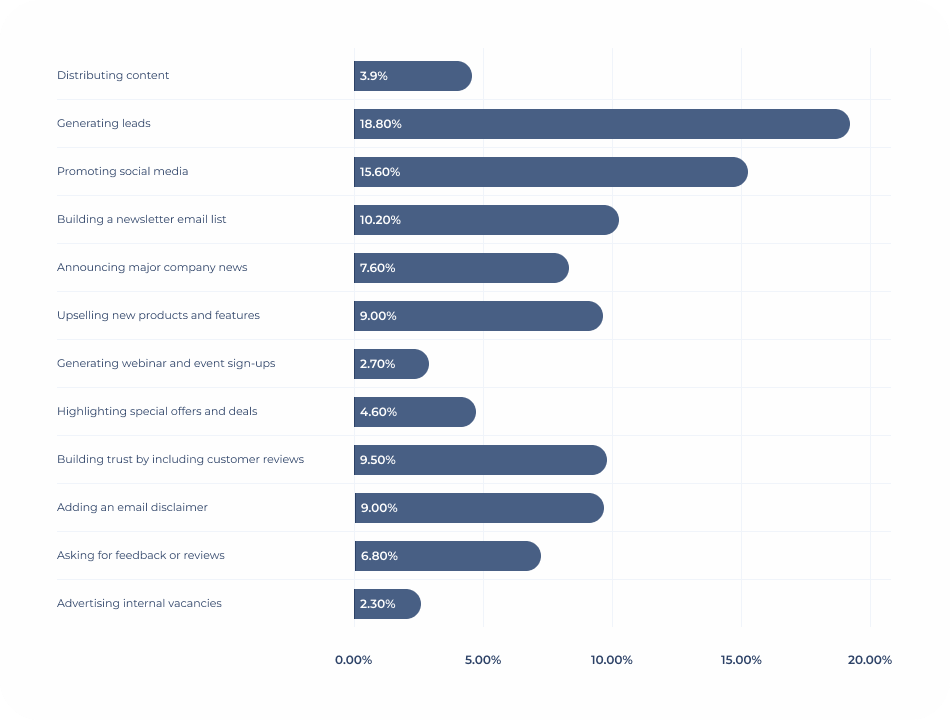
Which industries have the highest usage of email signatures?
Email signatures are widely used across industries, with marketing and sales professionals leading the way. They make up 14.5% of the top email signature users.
They are followed by real estate and construction professionals and agencies and consultants, both with 9.7%.
The e-commerce sector also shows a significant rate, with 8.1% of professionals using email signatures. Other industries include media and entertainment (6.5%), non-profit (6.5%), education (4.8%), and software and internet (3.2%).
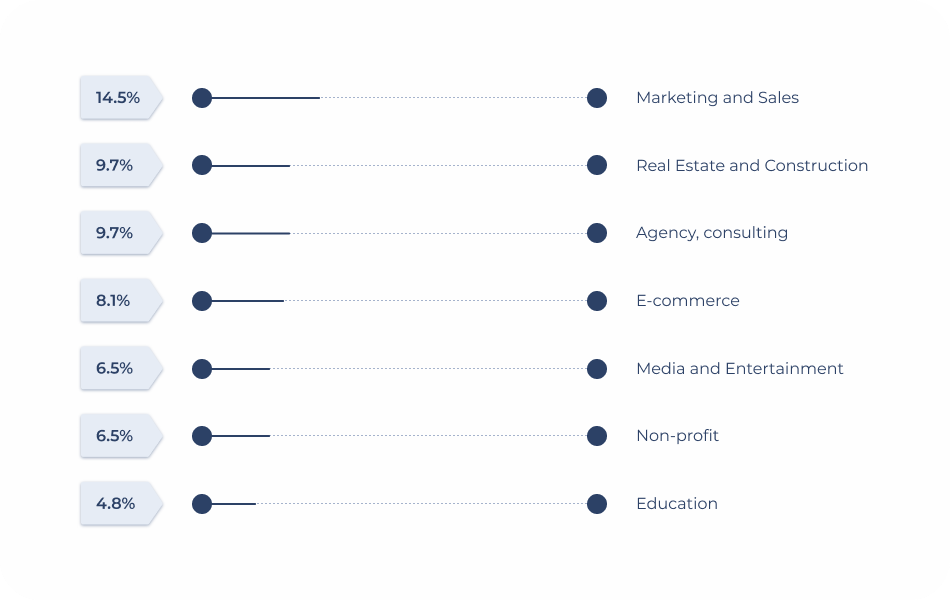
Across these industries, the most likely to have email signatures are C-level and director-level professionals.
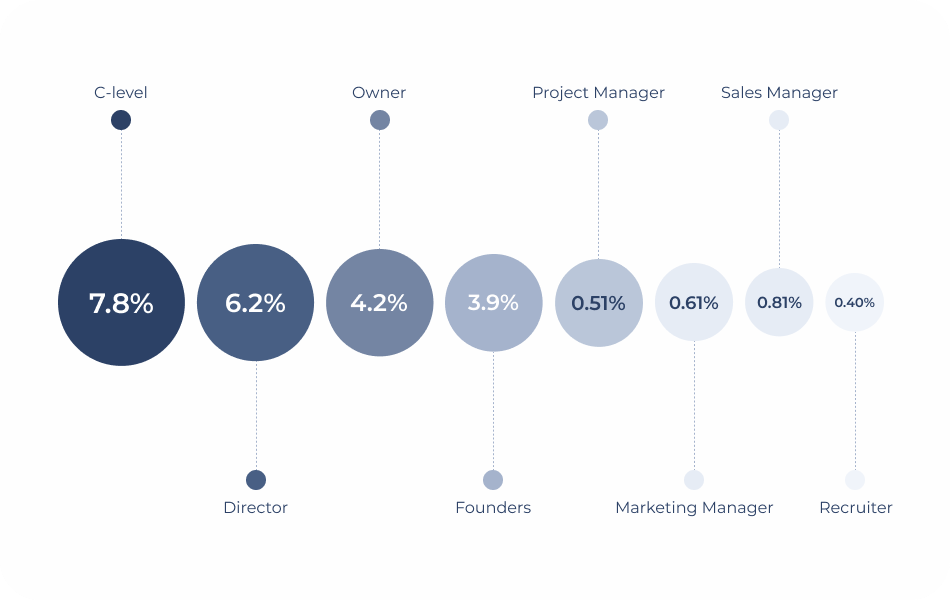
Most users (89.96%) have only one email signature, while a small proportion (around 8.6%) use up to 10 different signatures.
This indicates that many organizations might be missing out on the marketing potential of email signatures. Using multiple signatures can enhance brand promotion and marketing efforts, offering companies an opportunity to maximize their impact.
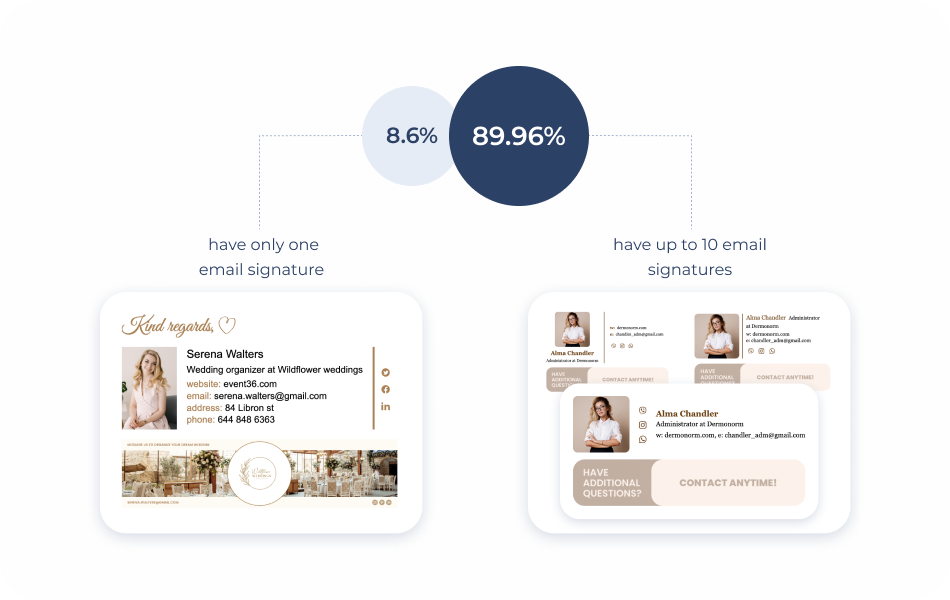
How frequently do users update their email signature(s)?
Updating an email signature is important to ensure that the information presented to recipients remains accurate and relevant, reflecting the sender’s current identity or business details.
Based on MySignature’s report, almost half of the users (44.4%) update their email signatures 2-4 times a year. This means they regularly refresh the signatures to make them look fresh and fitting.
In contrast, about one-third of users (31.6%) update their email signatures only every few years, showing a less frequent update pattern.
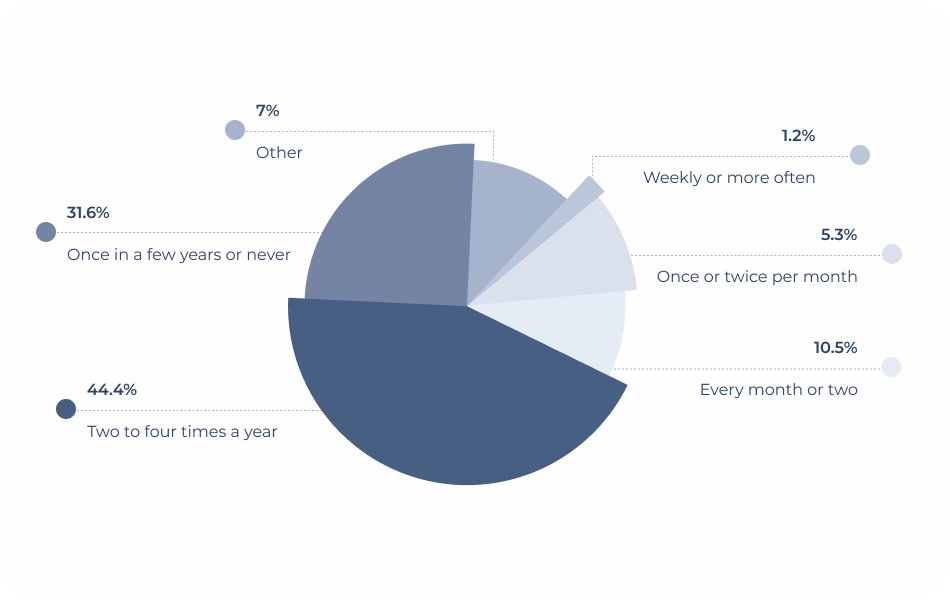
AI and Email Signatures
As artificial Intelligence (AI) is rapidly gaining momentum in the digital landscape, more organizations are recognizing its value. This raises questions about its impact on email marketing and the creation of email signatures, and how it will transform marketing practices worldwide.
According to the survey, 45% of respondents believe that AI can play a crucial role in analyzing customer data and personalizing email signatures to enhance engagement and conversions.
Furthermore, 29.4% of respondents think that AI can automate the process of creating and updating email signatures.
However, there is an ongoing debate about whether AI-driven automation truly enhances effectiveness in this context. This suggests that while AI can streamline the process, there may still be a need for human involvement and oversight to ensure optimal results.
Interestingly, 9.7% of respondents hold the view that AI can’t replace the creativity and personal touch that a human brings to crafting an effective email signature. This emphasizes the importance of human expertise and intuition in marketing strategies, even with the advancements of AI technology.
As AI continues to advance, it is expected to bring about significant changes in how marketers operate, offering new opportunities for personalization and automation.
However, the balance between AI-driven automation and human creativity remains an important consideration in leveraging the full potential of email signatures for effective marketing.
Ready to get started with your own email signature? Check out How to Write a Great Email Signature [+ Professional Examples].
About the Survey
The survey encompassed the responses of over 250+ participants, including small businesses, entrepreneurs, professionals in marketing and sales, freelancers, and real estate agencies. Additionally, data from 20,000 user accounts on MySignature were analyzed, providing a comprehensive view of email signature usage and trends.
The survey reached participants from various regions, including the United States, the United Kingdom, Germany, Spain, and India. This regional diversity contributes to a more comprehensive understanding of email signature practices on a global scale.
[ad_2]
Source link


![→ Download Now: The Beginner's Guide to Email Marketing [Free Ebook]](https://no-cache.hubspot.com/cta/default/53/53e8428a-29a5-4225-a6ea-bca8ef991c19.png)
